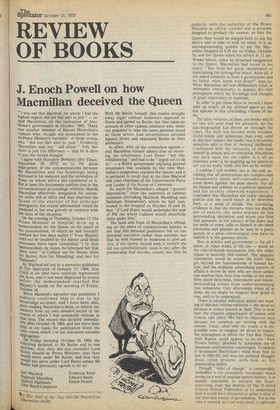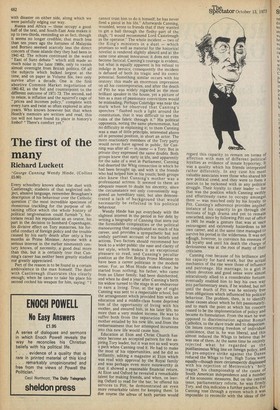REVIEW OF BOOKS
J. Enoch Powell on how Macmillan deceived the Queen
"1 was sad that Macleod, for whom I had the highest regard, did not feel able to join" — so said Macmillan, on the formation of Alec Home's government in October 1963. There was another member of Harold Macmillan's cabinet who, though not mentioned in the ex-Prime Minister's narrative* of those events, also " did not feel able to join." Evidently Macmillan was not " sad about " him; but there is just this difference — that he is alive to put the record straight. I agree with Humphry Berkeley (the Times, September 29, 1973) as to the gross Impropriety of the communications between Mr Macmillan and the Sovereign being disclosed in his memoirs and the unwisdom of But on whose advice she consented to it. tila at least the documents confirm that in the unconstitutional proceedings whereby Harold Macmillan effectively designated his successor while still in office and thus deprived the Queen of the exercise of her, principal Prerogative, the crucial information which he tendered to her was gravely at variance with the facts of the situation.
On the evening of Thursday, October 17, the Prime Minister in hospital drew up a Memorandum for the Queen on the result of his consultations, of which he had formally notified her two days earlier (" Your Majesty need not be troubled by the matter until these Processes have been completed.") In that Memorandum, he states, he informed her that there were "in Cabinet ten for Home; three for Butler; four for Maudling; and two for Hailsham."
. As Macleod set out in a narrative published In The Spectator of January 17, 1964, that could at no time have correctly represented the facts, and it had been disproved by events before the memorandum reached Her Majesty's hands on the morning of Friday, October 18.
When Macleod's narrative was published, I Publicly confirmed that it was to my knowledge accurate; and I have been able, since reading Macmillan's book, to refresh my memory from my own detailed record of the events of which I was personally Witness at that time. The record was dictated immediately after October 18, 1963, and has since been kept at my bank, for publication when the time comes which I or my executors consider appropriate. On Friday morning, October 18, 1963, the rollowing declared, to Mr Butler and to one a„nother, that they did not consider Lord nome should be Prime Minister, that they would serve under Mr Butler, and that they Would not serve under Lord Home unless Mr dutler had previously agreed to do so:
With Mr Butler himself, this makes straight away eight cabinet ministers opposed to Home and agreed on Butler; but that takes no account of other cabinet ministers who, while not prepared to take the same personal stand as those seven, had nevertheless advised against Home and expressed Butler as their preference. In effect, with all the contenders agreed — and Macmillan himself admits that on receiving the information Lord Home "felt like withdrawing" and had to be " urged not to do so" — a Butler government enjoying general acceptance was available by the time Macmillan's resignation reached the Queen; and it is pertinent to recall that at the time Macleod was joint chairman of the Conservative Party and Leader of the House of Commons.
So much for Macmillan's alleged "general impression" from the selection of cabinet ministers (including Macleod, Maudling and Hailsham themselves!) whom he had summoned to the hospital on October 15 and 16, that "if Lord Home would undertake the task of PM the whole Cabinet would cheerfully unite under him."
The head and front of Macmillan's offend ing on the plans of constitutional history is not that this personal preference fell on one potential successor rather than another, nor
that he held himself in readiness to give advice, if the Queen should seek it (which she 'did not constitutionally need to do) after the premiership had become vacant, but that he,
publicly, with the authority of the Prime Minister in office, carried out a process designed to produce the answer, so that the Queen then would be obliged both to ask his advice and to take or seek no other. It is an uncomprehending quibble to say the Macmillan resigned at 9.30 am on Friday, October 18, and the Queen asked his advice at 11 am. Weeks before, when he broached resignation to the Queen, Macmillan had noted in his diary: " She feels the great importance of maintaining the prerogative intact. After all, if she asked someone to form a government and he failed, what harm was done?" Just so. What Macmillan did was deliberately (and, in retrospect, conclusively) to destroy the very prerogative which his Sovereign had thought of great importance to maintain.
In order to put these facts on record, I have used up nearly all my allotted space on the last episode in this concluding volume of the six.
The liter volumes, at least, are books which no one will ever read for pleasure. As the autobiographer has drawn on through the years, the style has become more wooden, • cliche-ridden and pedestrian than ever, until in this last volume the reader has a recurrent sensation akin to that of chewing cardboard. Confronted with the virtuosity of the man himself in person and on television, this drives one back upon the old riddle: is it all an elaborate pose? is he laughing up his sleeve at us? can he really think and feel as he writes?
confess I still wobble; but in the end, accepting that all personalities are complex and consequently admit self-contradictions, I come down against the pose theory. For all his finesse and subtlety as a political opdator, and his acutely observed experience, I concluded that Macmillan did really visualise politics and the world much as he describes them, in a series of cliches. The convincing evidence is that the extracts from his diaries are of exactly the same texture as the surrounding narrative; and when you find that someone, in the privacy of his diary and the midst of event, talks to himself in the same platitudes and phrases as he uses in a party speech or a press communique, you have to believe it is the genuine article.
Men in politics and government — for all I know, in other walks of life too — work on the rule-of-thumb assumption that the other fellow is basically like oneself. The opposite assumption would be nearer the truth. Once get beyond the fundamentals of human nature, and the endlessly astonishing pattern of affairs is woven by men who are more unlike one another than they ever realise at the time. How much bitterness, resentment and misunderstanding comes from under-estimating that unlikeness. Only afterwards, when all is done, do we begin to suspect how great it was, and 'so to understand.
There is another reflection which the reading of this last volume enforces — the more so because it comes nearest in date. This is how fast the relative importance of issues and events can alter. We fail to observe this because we ourselves are moving with the stream. Today, after only ten years, it is impossible even to. imagine, let alone to regain, the atmosphere in which the Test Ban Treaty with Russia could appear to be the ' Fair Flower Safety,' plucked by statesmen out of imminent international catastrophe. Evidently it dominated Macmillan's mind from first to last in 1961-63, and was the political thought most often present with him as his premiership ended.
Though "wind .of change" is irretrievably embedded in the journalistic vocabulary which serves as a sort of popular potted history, it is equally impossible to retrieve the heartsearching over the demise of the ill-fated Central African Federation or to understand how it could have devoured so great a slice of the time and energy of goveenment. Yet at the time it seemed, as 1 can well recall, a tightrope
with disaster on either side, along which we were painfully edging our way.
Russia and Africa — these occupy a good half of the text, and South-East Asia makes it up to two-thirds, reminding us as fact, though it seems no longer credible, that much less than ten years ago the fortunes of Malaysia and Borneo seemed scarcely less the direct concern of these islands they they had been in 1941-42. The echoes continued in the weird "East of Suez debate" which still made so much noise in the later 1960s, only to vanish almost overnight from British politics. Of all the subjects which bulked largest at the time, and on paper in Volume Six, two only survive after a decade. One is the first abortive Common Market negotiation of 1961-62, as the foil and counterpoint to the different outcome of 1971-72. The second, sad to relate, is inflation and the squirrel's cage of "prices and incomes policy," complete with every turn and twist so often explored in after years. Who knows however but that when Heath's memoirs are written and read, this too will not have found its place in history's limbo? "There's comfort yet."



































 Previous page
Previous page